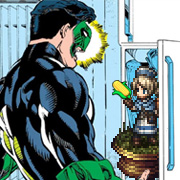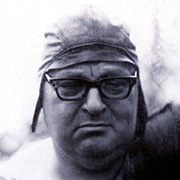|
Philly is cool if you're an early American history buff. Otherwise pretty poo poo. Anyways, just came in to say I was listening to a Pod on PTA's films and the hosts described Pynchon as the Terrence Malick of Literature which I found very funny.
|
|
|
|

|
| # ? May 20, 2024 04:27 |
|
When I was growing up and reading Greek literature, I used to always hear "well, Greek Heroes aren't exactly what we'd call heroes." And, indeed, maybe they aren't what we'd call heroes, but that's only because the values we prize are so different from Ancient Greece's. These were heroes to the Greeks, as deserving of admiration as our heroes are. Although there were multiple currents running through Greece even back then. I suppose my understanding has been largely shaped by Nietzsche's idea that all the Greek values were ruined by Socrates and Christianity. But yeah, as I go through the works of Sophocles, I have a few books analyzing Sophocles that I've really enjoyed reading for the light they shed on how differently Greeks thought of heroism than we do. quote:There are two qualities deeply rooted in the Greek view of heroism which make it different from all other views, and these are qualities of the hero himself. The first is self-destructiveness. The hero is pri¬ marily, in most mythologies, the man whom nobody can destroy; but in Greece he was the man who had to destroy himself. The normal mal assumption, perhaps, would be that Achilles, with his superhuman strength and speed, his divine armor, his immortal horses, and the Pelian spear, would almost inevitably live to an advanced age. But it is precisely the opposite. The necessary condition (aisa, moira) of these supreme gifts is misery and an early death. Achilles is the saddest man at Troy.1 But his grief and death are not foreordained by an external fate; they are foreordained by that innermost quality known to Homer — arete. Achilles had his choice between long life and greatness;2 he chose greatness, and therefore was Achilles. His greatness, however, was a kind of continual spending of himself, and Achilles was already on his way to self-destruction long before he slew Hector. For the self-destructiveness of the hero hinges upon a certain excess, an ability to outdo not only everyone else, but especially himself, for whom he has no regard except as the receptacle of certain supreme standards.3 There are exceptions, of course, the most notable being the adroit Odysseus; but a surprising majority of Greek heroes stride grimly into ruin. It's just so interesting to me because the dichotomy here between Ajaz and Odysseus would be reversed in any modern story. Odysseus with his reasonableness and pity, would always be the superior hero to a prideful mdman like Ajax.
|
|
|
|
NikkolasKing posted:When I was growing up and reading Greek literature, I used to always hear "well, Greek Heroes aren't exactly what we'd call heroes." And, indeed, maybe they aren't what we'd call heroes, but that's only because the values we prize are so different from Ancient Greece's. These were heroes to the Greeks, as deserving of admiration as our heroes are. Although there were multiple currents running through Greece even back then. I suppose my understanding has been largely shaped by Nietzsche's idea that all the Greek values were ruined by Socrates and Christianity. I mean Odysseus survived in popular memory way longer than Ajax. He had plenty of fans in the classical period. The Aenid isn't based on the legends of Ajax.
|
|
|
|
Whose got the soap though?
|
|
|
Gaius Marius posted:Whose got the soap though? 
|
|
|
|
|
Gaius Marius posted:Whose got the soap though? no soap, radio!
|
|
|
Gaius Marius posted:Whose got the soap though? I don't pick up my phone
|
|
|
|
|
Most of the way through Borges' stories, I started worrying that he'd run out of ideas, returning time and time again to the same things. Then I reached "Everything and Nothing," an account of the life of Shakespeare which stunned me.
|
|
|
|
Nabokov Was Wrong About Borges
|
|
|
|
|
mdemone posted:Nabokov Was Wrong About Borges he calls Borges “a man of infinite talent” so I think he was correct, for once
|
|
|
|
less than 80 pages to go of the first volume of The man without qualities and the beginning felt a lot stronger than most of the book itself so far. I think I prefer Mann’s The magic mountain over this, a book that feels similar in how it’s also about capital A Art and Literature and ideas of man, etc.
ulvir fucked around with this message at 13:50 on Feb 27, 2024 |
|
|
ulvir posted:he calls Borges “a man of infinite talent” so I think he was correct, for once Well poo poo I was playing the odds again. Nabokov Was Right About Borges
|
|
|
|
|
ulvir posted:less than 80 pages to go of the first volume of The man without qualities and the beginning felt a lot stronger than most of the book itself so far. I think I prefer Mann’s The magic mountain over this, a book that feels similar in how it’s also about capital A Art and Literature and ideas of man, etc. The second part is pretty different and more memorable to me, but once you get to the plot switch (sort of, in a very minor way) you start to realise that this is a book that could never possibly have been finished, which may or may not make it feel like a slog. I read The Magic Mountain around the same time, and while Musil's book is a sort of a disaster, I did like it a lot more, because Mann's feels too classically neat, and a bit prudish and teacherly. Musil was way more modern
|
|
|
|
i’m gonna read part II as well, but after a few other books in between just for a bit of variety’s sake
|
|
|
|
GR page 110... I had no forewarning of the sequence about the slaughter of the dodoes... beautiful and heartbreaking.
|
|
|
|
I'm reading Moby Dick. I'm about 2 percent of the way through (kindle doesn't show pages). It's terrible. Imma read the other 98 percent though.
|
|
|
|
Just finished Seiobo There Below. Think it's my new favourite Krasznahorkai
|
|
|
|
seiobo is amazing.
|
|
|
|
“Guayaquil” is unexpectedly my possibly favorite Borges story.
|
|
|
|
bought M by Scutari. on the cover of the norwegian translation, Mussolini just stares menacingly towards the camera.
|
|
|
|
Do you think that breaking away from some established boundaries of a style of writing is a good indicator that something might be worthwhile? Adding something new, not being innovative rather challenging mores. And I don't mean in a straining way but an honest way?
|
|
|
|
I think it could be, if I understand your question correctly. as an example, there’s a younger Norwegian author who has developed a kind of narrative voice where she lets the narrator “interrupt”, comment or react on the story and plot, as if by impulse. like suddenly adding “(?????)” after a quote or description of the character, etc. so the narrator is sort of reacting to their own narration as if by looking back at it. it isn’t breaking any new grounds or being purely experimental, but she is sort of breaking some established “rules” or conventions in a way that also feels personal or, idk, real/authentic, but also unique. every other aspect of her novels are pretty conventional and straightforward otherwise.
ulvir fucked around with this message at 15:58 on Feb 29, 2024 |
|
|
|
I don't think it's a good indicator of quality but when it's done right it can certainly elevate a work beyond the standard fare. JR wouldn't be anywhere near as effective if it had been written as a standard story, there's just no way to get across the frantic and overwhelming nature of it all except with its barely coherent strings of unattributed dialogue. However, someone writing that same way without a reason would be completely unreadable garbage.
|
|
|
|
Mrenda posted:Do you think that breaking away from some established boundaries of a style of writing is a good indicator that something might be worthwhile? Adding something new, not being innovative rather challenging mores. And I don't mean in a straining way but an honest way? did you ask this with something in mind?
|
|
|
|
ulvir posted:I think it could be, if I understand your question correctly. as an example, there’s a younger Norwegian author who has developed a kind of narrative voice where she lets the narrator “interrupt”, comment or react on the story and plot, as if by impulse. like suddenly adding “(?????)” after a quote or description of the character, etc. so the narrator is sort of reacting to their own narration as if by looking back at it. it isn’t breaking any new grounds or being purely experimental, but she is sort of breaking some established “rules” or conventions in a way that also feels personal or, idk, real/authentic, but also unique. every other aspect of her novels are pretty conventional and straightforward otherwise. not related to the original question but i read a poetry collection recently where the poet wrote a long autobiographical poem about coming to grips with identity/sexuality/etc. and then gave it to her mother so she could add little footnotes like "i don't remember this" or "sorry you felt this way! i had no idea" and it's a very good bit.
|
|
|
|
ulvir posted:I think it could be, if I understand your question correctly. as an example, there’s a younger Norwegian author who has developed a kind of narrative voice where she lets the narrator “interrupt”, comment or react on the story and plot, as if by impulse. like suddenly adding “(?????)” after a quote or description of the character, etc. so the narrator is sort of reacting to their own narration as if by looking back at it. it isn’t breaking any new grounds or being purely experimental, but she is sort of breaking some established “rules” or conventions in a way that also feels personal or, idk, real/authentic, but also unique. every other aspect of her novels are pretty conventional and straightforward otherwise. Yeah, I've done that in my own work. I don't think it's "conventional and straightforward" though. Which is the question I was asking. Is a simple change from normality enough to incite questions about writing, reading or understand? My story is here, What Even Is Harmony. It's a pretty decent book. I assume it gets a security warning for being HTTP instead of HTTPS. I couldn't do the footnotes in an e-book though. On the broader point I see people writing without quotations marks for what I feel is a pretense at "literature minded-ness." Some people look at them and say, "Oh! It doesn't have quote marks, that means it's challenging and art!" When I remember reading French novels from the 50s written this way, and bringing it up with other authors, and them dismissing me. With hostility. It just seems weird, specifically the indicators you're talking about. Actual "indicators" "signs and symbols." Marketing, effectively. Solar Bones is a good book. Read to the end. Get the Irish edition published by Tramp Press. No difference in the text, as far as I know. There is different in the hypertext. An important one. I think Goodreads talks about this. cumpantry posted:did you ask this with something in mind? Becky Chambers, specifically. Because why I've had her first book in a Waterstones bag for a week or two is it's described as being character driven in the sci-fi world. Which is, I know, fundamentally groundbreaking. I want to see how it's understood, though, or "why." 
|
|
|
|
Tree Goat posted:not related to the original question but i read a poetry collection recently where the poet wrote a long autobiographical poem about coming to grips with identity/sexuality/etc. and then gave it to her mother so she could add little footnotes like "i don't remember this" or "sorry you felt this way! i had no idea" and it's a very good bit. That sounds really cool. I feel it's warped by the fact that it involves a mother that it agrees to do this. And be published. Not reflective of broader society, in a way. Possibly my own incorrect injudgement.
|
|
|
|
Hi all! Please stop by the book club thread and vote for which review written by a goon should win the January contest and that book become the next book of the month!
|
|
|
|
|
I've started Pamuk's Snow
|
|
|
|
i was gonna read Virginia but there's only enough room for one title at a time that starts with V
|
|
|
|
fridge corn posted:I've started Pamuk's Snow its so loving good. i still think about it a lot
|
|
|
|
Is the Scott Montcrieff/Kilmartin translation of In Search of Lost Time still good? It's the silver Vintage edition. Mrenda posted:Solar Bones is a good book. Read to the end. Get the Irish edition published by Tramp Press. No difference in the text, as far as I know. There is different in the hypertext. An important one. I think Goodreads talks about this. Solar Bones is indeed good. What's the difference in the hypertext? I read the physical book. The Becky Chambers thing is just puffery.
|
|
|
|
Mrenda posted:Becky Chambers, specifically. Because why I've had her first book in a Waterstones bag for a week or two is it's described as being character driven in the sci-fi world. Which is, I know, fundamentally groundbreaking. I want to see how it's understood, though, or "why." I've read a couple of Becky Chambers books. I couldn't really get into her Wayfarers books (I'm just not that into Star Trek pastiche, I guess), but I read both of her Monk and Robot novellas. The first book in the series is a bit stronger, I think. I have mixed feelings about it. I've seen it come up now and then as a sort of "quietly revolutionary" story insofar as it grants major moral value to comfort, rather than ambition or industry or productivity. It manages to accomplish this by imagining a far-off civilization that lives on a small moon with a post-scarcity ecofriendly infrastructure, where people believe in a chill and tolerant religion that doesn't seem to ask much of them. I think as a piece of literature, it's basically a cup of Sleepytime tea. Late capitalist society is so utterly hosed that a story that says "imagine a future where people figured out how to have comfortable lives without destroying the earth, and where everyone's comfort is considered a basic human need" serves as a kind of existential backrub, trying to loosen the reader's pent-up tensions and restore them to some kind of a sane baseline where it's considered okay for adults to think "you know, it would be nice if things were nice." I have to admit I had some resistance to the story for how disarmingly positive its imaginary future is. I guess that makes it very New Sincerity, and in a way it's kind of punk, in the same way that drag queen storytimes in public libraries are kind of punk. i think the sequel is a lot rougher, because it introduces some elements that I think it doesn't fully manage to wrangle. The society is basically based around trading utils, but the story seems incapable of imagining a utility monster. And it handwaves an obvious scifi analog to the Amish without interrogating any of the ramifications that might arise from isolationist social units. By adding those extra details, the imagined world becomes more realized, but it also becomes more obvious that the books are operating in a naive mode where the basic existence of evil isn't going to be acknowledged. in my opinion the monk and robot books are scifi novellas with the aesthetics of a slice of life anime/manga, which is fine and all, but if you place them within that genre of slice-of-life anime/manga, they don't seem especially notable. and of course there is absolutely nothing groundbreaking about character-driven scifi. But "character-driven" is kind of a misnomer for the issue, I think. The Metamorphosis is character-driven; Lolita is character-driven. I don't think the issue is that her stories are character-driven rather than plot-driven, but that her stories (from what I've read of them) seem interested in the daily lives of average people.
|
|
|
|
Cephas posted:I've read a couple of Becky Chambers books. I couldn't really get into her Wayfarers books (I'm just not that into Star Trek pastiche, I guess), but I read both of her Monk and Robot novellas. The first book in the series is a bit stronger, I think. I have mixed feelings about it. I've seen it come up now and then as a sort of "quietly revolutionary" story insofar as it grants major moral value to comfort, rather than ambition or industry or productivity. It manages to accomplish this by imagining a far-off civilization that lives on a small moon with a post-scarcity ecofriendly infrastructure, where people believe in a chill and tolerant religion that doesn't seem to ask much of them. Yeah, this is kind of what I was getting at in my questioning. That the story itself can be elevated by dint of simply being a challenge to orthodoxy, or at least perceived wisdom. Of course, there's many examples of stories that challenge in this way, and it's simple commercial success/readership that elevates one book rather than another. I did buy the first Chambers book though, as someone brought her (and others) up in the discord. Neal Asher was another I was interested in, because, according to wikipedia, "When combined with the way that Asher's main characters are usually acting to preserve social order or improve their society (rather than disrupt a society they are estranged from)"... it again raises the point of is the simple challenge to perceived wisdom enough to add, or does it add enough, to make something "worthy." And by "worthy" I mean being mentioned in the "real lit" thread, where serious discussion of books happens between curmudgeons. Although my view is all stories are "real lit" if you engage with them and treat them as such. Which is something a lot of SFF writers do not want for their work despite claims they really are "real lit."
|
|
|
|
started on M. son of the century. it’s pretty good so far.
|
|
|
|
yes. good.
|
|
|
|
Lex Neville posted:yes. good. I see you're about four years ahead of me on that one (it was only translated to norwegian autumn last year)
|
|
|
|
Walked into a used bookstore and saw the full set of in search of lost time, which of course i had to buy. Guess it is time
|
|
|
|
Mrenda posted:Do you think that breaking away from some established boundaries of a style of writing is a good indicator that something might be worthwhile? Adding something new, not being innovative rather challenging mores. And I don't mean in a straining way but an honest way? Absolutely, but I wonder where the line between "straining" and "honest" actually is. Case in point, I read Gertrude Stein's "Food" a couple of weeks ago, and the entire text is made up of "prose" like this: quote:EGGS Now, I'm always one to admit my own ignorance and shortcomings as a reader. Just because I don't "get" a book, I'm not going to reflexively dismiss it as "nonsense" or "trash": I'm always open to the possibility that I just lack the background knowledge to appreciate it. But with prose like this, I just cannot shake the feeling that there really is nothing here to "get", that the emperor really is walking around naked. If anyone can give me some indication of what I might be missing - some foothold in literary theory that would allow me to appreciate book in any way at all - then I'm all ears, of course, but otherwise it just reads as impenetrable nonsense that is intended to be impenetrable nonsense - in which case, what's the point? What is the reader supposed to take away from their engagement with a text like this? To me the laziest form of art is art which seeks to challenge my preconceptions of what art is. I view it as lazy, because such approaches to art place all of the responsibility for meaning creation on the audience, and thereby shelter the artist from criticism, because negative reactions can simply be appropriated by the artist as an intentional product of the very "challenge" laid down by the piece in the first place. "Of course people are going to be angry or bewildered if I dump a load of dirt on the floor of an art gallery and call it art - these are exactly the sorts of prejudices that I'm seeking to confront and bring to light!". I view "Food" as the literary equivalent of that. "But it doesn't make any sense!" - Who says literature has to make sense? The world doesn't make sense, why should literature? "But it's not remotely pleasant to read!" - Oh, so now literature has to be pleasant to read? Is it not the artist's responsibility to bring the ugliness of the world to light where necessary? "But it doesn't even mean anything!" - Hmmm, yes. But what is "meaning"? Isn't all language ultimately just as arbitrary set of free-floating signs? And so on, and so on. If it was Stein's intention to get me to confabulate these sorts of inner dialogues with myself then mission accomplished, I suppose, but otherwise I think there's a definite line - however blurry or ill-defined - between meritorious literary innovation and self-indulgent wank, and the author should always take care to make sure her own work falls on the right side of that line. We can debate where that line lies, of course, but I think it's important to acknowledge that the line really does exist.
|
|
|
|

|
| # ? May 20, 2024 04:27 |
|

|
|
|
























